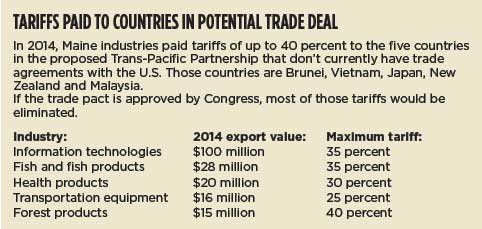The proposed Trans-Pacific Partnership trade agreement will boost Maine exports to partner countries by removing nearly all tariffs on seafood, forest products, information technology and other goods, according to a U.S. Department of Commerce report issued Thursday.
The report notes that in 2014, Maine exported more than $1.8 billion worth of goods to the 11 foreign nations participating in the proposed trade agreement, known as TPP. Six of those countries – Australia, Canada, Chile, Mexico, Peru and Singapore – already participate in existing trade agreements that offer preferential market access to U.S. exporters. However, the other five TPP countries – Brunei, Japan, Malaysia, New Zealand and Vietnam – do not.
Eighty percent of U.S. imports from TPP countries are duty-free, while U.S. exporters continue to pay tariffs on a much higher percentage of goods they send to TPP countries.
In Maine, exporters pay tariffs of up to 40 percent on forest products, 35 percent on seafood and technology, 30 percent on health products and 25 percent on transportation equipment, the report said. Most of those tariffs would be eliminated.
“The Trans-Pacific Partnership is a transformational agreement that will benefit businesses and workers across the country,” said U.S. Secretary of Commerce Penny Pritzker during a media teleconference following the report’s release. “By eliminating more than 18,000 tariffs on made-in-America products sold overseas, the TPP will make it possible for more of our high-quality goods and services to reach some of the world’s fastest-growing markets.”
TPP markets already are important to Maine businesses, with more than 67 percent of Maine’s exports going to TPP partners in 2014, according to the report. Total Maine goods exported to TPP markets included $105 million to Malaysia, $98 million to Japan and $6 million to Vietnam, it said.
Once implemented, TPP would strengthen Maine companies by lowering the costs of doing business in those markets and ensuring fair treatment for Maine businesses, it said. It would eliminate foreign-import taxes on all industrial and consumer goods, including Maine’s top exports to new TPP markets: information and communication technologies, fish and fish products, and health products.
“Our businesses and our workers will be able to compete fairly,” U.S. Trade Representative Michael Froman said during the teleconference.
TPP is controversial because it was negotiated in secret, and its entire contents were released to the public only last week.
Many U.S. lawmakers, including some in Maine, have called for greater transparency and vowed not to vote for the agreement. U.S. participation in TPP can only be approved by a majority vote in Congress.
Forest industry analyst Lloyd Irland, of The Irland Group in Wayne, said the five “new” TPP countries are not major importers of Maine wood products, which means the proposed trade agreement would not likely provide a significant boost to the industry. The Commerce Department said $15 million in forest products was exported to the five new TPP markets in 2014. But the total value of forest product exports that year exceeded $700 million, according to Maine International Trade Center data.
“Some of those are tiny countries,” said Irland. “I have a hard time imagining that we’re going to notice.”
Send questions/comments to the editors.




Success. Please wait for the page to reload. If the page does not reload within 5 seconds, please refresh the page.
Enter your email and password to access comments.
Hi, to comment on stories you must . This profile is in addition to your subscription and website login.
Already have a commenting profile? .
Invalid username/password.
Please check your email to confirm and complete your registration.
Only subscribers are eligible to post comments. Please subscribe or login first for digital access. Here’s why.
Use the form below to reset your password. When you've submitted your account email, we will send an email with a reset code.